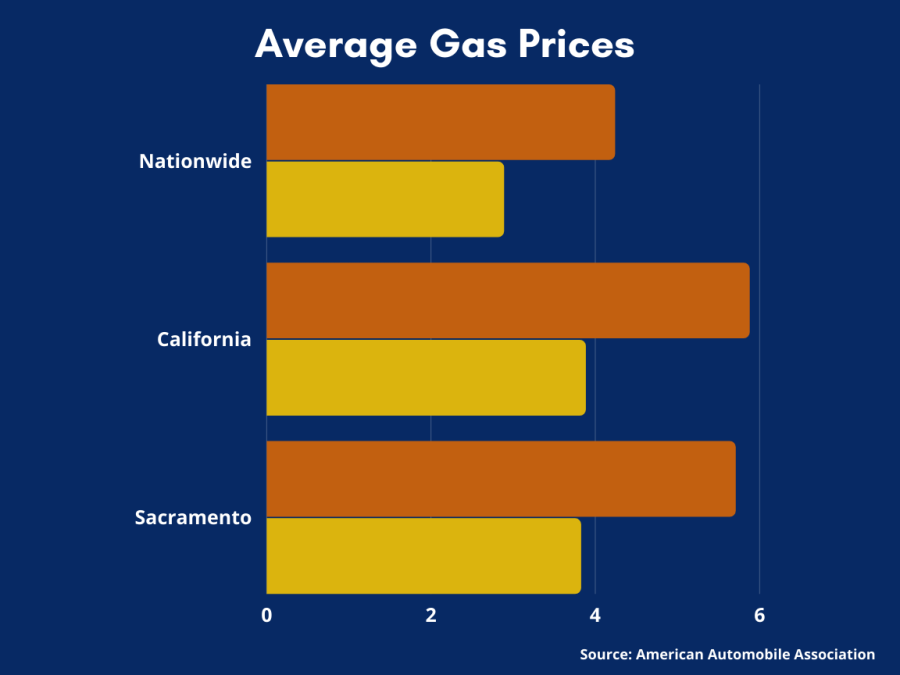Students struggle as gas prices surge
A graph showing today’s average gas price in the United States, California and Sacramento compared to the average gas price one year ago, according to the American Automobile Association. Gas prices continue to rise as a result of the pandemic and the Russian invasion of Ukraine.
The average gallon of gas in Sacramento hit $5.70 and the state-wide average reached $5.87, according to AAA.
Twenty one year old Said-Yusuf Sadat, a computer science major at Cosumnes River College, said it costs more than $45 to fill up his gas tank. He said he uses public transportation a lot to help ease the costs.
“I take the bus, the light rail, anything that can get me around the city or [CRC] and back to my house,” Sadat said.
Economics Professor Dennis Meyers said there are an array of factors behind soaring gas prices.
The surge in activities requiring gasoline, after the long pandemic-induced shutdowns, ignited the initial jump in prices.
Moreover, war breaking out in Ukraine only served to fuel the already high prices as nations scramble to impose sanctions against Russia, said Meyers.
Emma Ackerman, a 19-year-old public health major, said the cost of gas makes it hard to pay for other expenses.
“It just takes a lot out of me. I work part time, so I’m really not making a lot of money,” Ackerman said. “And so when it rose, it just took a lot out of my bank account and I can’t pay for anything else I need to pay for.”
Ackerman said she started carpooling with her neighbor about twice a week to help save money. She pays $20 per week, which she said is less than what she would have to pay for gas.
Meyers said the strong economy is contributing to the high prices.
“The U.S. economy is going pretty strong now, whenever the economy runs well, the demand of oil and gasoline goes up, driving prices up and then you have these sanctions, maybe leading to the cut off of oil, and combine those factors together you get this sudden surge in prices,” Meyers said.
Meyers said oil markets tend to be speculative when international events turn volatile, even the anticipation of a gas shortage causes gas prices to spike.
“The oil system globally, there’s not a lot of storage, there’s not a lot of built up reserves of oil, so any little interruption, or glitch in the system can ripple through on down the chain anywhere in the world and into the gas market in particular,” Meyers said.
Culinary arts major Hailey Duckworth, 18, said she walks to campus because she does not have her license, one of the reasons being inflated gas prices.
“I kind of wish they’d lower the gas prices. So that everybody can be able to afford it,” Duckworth said, referring to the government.
California lawmakers are debating the best course of action to support residents hurting at the pump.
Democratic leaders of the state Assembly and Senate proposed their own plan to provide $200 to taxpayers and dependents that fall under the $250,000 income bracket, according to a statement released by Senate President Pro Tempore Toni Atkins (D-San Diego).
A separate group of democratic lawmakers announced their proposal to send $400 to every taxpayer regardless of their income, according to a press conference held by Assemblywoman Cottie Petrie-Norris (D-74th District).
Gov. Gavin Newsom has yet to reveal the details of his plan but signaled to some form of a tax rebate in his State of the State Address.
Meyers said another approach could be reducing the California gasoline tax with the idea that that would lead to a decline in gas prices.
“The downside of that approach is there is no guarantee that a reduction of the California state tax is gonna immediately turn into a penny for penny reduction price in gas. Over the long haul it might, if you reduce that tax for the next year, two years, three years,” Meyers said.
Meyers said one of the downsides of putting money directly into people’s pockets is that it might cause inflation in other areas.
Meyers said the gas tax reduction approach would directly impact those buying gas. While a broad based tax rebate might provide financial relief to those who are not buying gasoline.
“They both have their tradeoffs. Neither one’s ideal,” Meyers said.
However, high gas prices are good for the environment, Meyers said.
“It’s hurting people’s budget, and pocket books, but does cause us to be more fuel efficient which leads to a lot of other benefits,” Meyers said.

